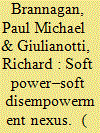|
|
|
Sort Order |
|
|
|
Items / Page
|
|
|
|
|
|
|
| Srl | Item |
| 1 |
ID:
146048


|
|
|
|
|
| Summary/Abstract |
Joseph Nye’s concept of “soft power” has become an increasingly used term to help explain why states—including so-called “emerging states”—are paying greater attention to acquiring various forms of cultural and political attraction. However, within mainstream International Relations, Political Science, and Sport Studies literature, a continuous debate remains as to what actually constitutes soft power, how national leaders go about acquiring it, and how forms of attraction convert into power outcomes in both the short- and long-term. This analysis endeavours to overcome these issues by offering an “ideal type” model that details states’ soft power strategies, the mechanisms they use, and the tangible future outcomes they gain.
|
|
|
|
|
|
|
|
|
|
|
|
|
|
|
|
| 2 |
ID:
161723


|
|
|
|
|
| Summary/Abstract |
There are four areas in which soft power is open to critical scrutiny. First, research has centred on large and/or developed nations, notably in North America, Europe, east Asia and the BRICs. Second, scholars have called for greater clarity of the concept, noting that it lacks clear explanation of how instances of attraction equate to various power outcomes. Third, others suggest Joseph Nye developed an Americanized-centric understanding of soft power, and hence a narrow account of what constitutes ‘attraction’. Finally, research has failed to examine how states' soft power attempts can backfire, leading to what we call ‘soft disempowerment’. Drawing on the case of Qatar—with a particular focus on the state's acquisition of the 2022 FIFA World Cup finals—we seek to offer responses to these criticisms. We do this by refining the concept of soft power to take account of variegated power outcomes, and by focusing on a small state and a non-American context, in order to explore the intersections of soft power and soft disempowerment. In doing so, we introduce the ‘soft power–soft disempowerment nexus’ which, we go on to argue, affords an analytical framework for examining how soft power works and how it may be hampered through negative international scrutiny.
|
|
|
|
|
|
|
|
|
|
|
|
|
|
|
|
|
|
|
|
|